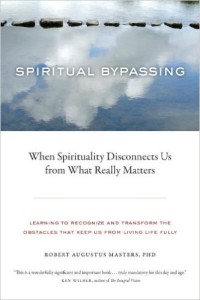An introduction to Spiritual Bypassing by Robert Masters
 “Spiritual bypassing, a term first coined by psychologist John Welwood in 1984, is the use of spiritual practices and beliefs to avoid dealing with our painful feelings, unresolved wounds, and developmental needs. It is much more common than we might think and, in fact, is so pervasive as to go largely unnoticed, except in its more obvious extremes.
“Spiritual bypassing, a term first coined by psychologist John Welwood in 1984, is the use of spiritual practices and beliefs to avoid dealing with our painful feelings, unresolved wounds, and developmental needs. It is much more common than we might think and, in fact, is so pervasive as to go largely unnoticed, except in its more obvious extremes.
Part of the reason for this is that we tend not to have very much tolerance, either personally or collectively, for facing, entering, and working through pain, strongly preferring pain-numbing “solutions,” regardless of how much suffering such “remedies” may catalyze. Because this preference has so deeply and thoroughly infiltrated our culture that it has become all but normalized, spiritual bypassing fits almost seamlessly into our collective habit of turning away from what is painful, as a kind of higher analgesic with seemingly minimal side effects. It is a spiritualized strategy not only for avoiding pain but also legitimizing such avoidance, in ways ranging from the blatantly obvious to the extremely subtle.
Spiritual bypassing is a very persistent shadow of spirituality, manifesting in many forms, often without being acknowledged as such. Aspects of spiritual bypassing include exaggerated detachment, emotional numbing and repression, overemphasis on the positive, anger-phobia, blind or overly tolerant compassion, weak or too porous boundaries, lopsided development (cognitive intelligence often being far ahead of emotional and moral intelligence), debilitating judgment about one’s negativity or shadow side, devaluation of the personal relative to the spiritual, and delusions of having arrived at a higher level of being.”
